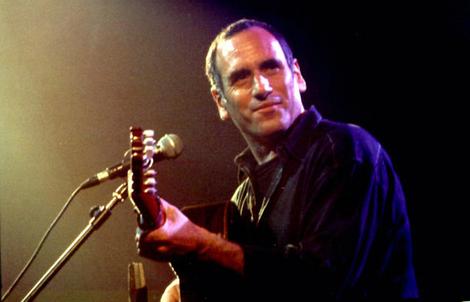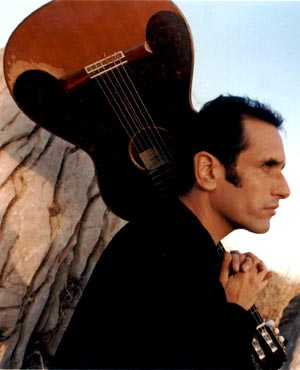It was the mystique of American music and it’s hypnotic allure that first brought Israeli-born musician David Broza to the United States in 1984. Little did he know what was to come in the form of a collaboration with Townes Van Zandt
“When I first came to the United States, I wanted to find out where the music of Hendrix came from, of Buddy Holly, Johnny Cash, Bob Dylan. I wanted to find out where John Coltrane had come from, Charlie “Bird” Parker, where they played. I wanted to find out what it was behind that ‘incredible person’, was it just the environment that they played in? Was that part of what made them who they became? Just what was it?”
Little did David Broza know that ten years after he first hit America’s shores in search of enlightenment, an unlikely meeting with legendary country/folk cult musician and poet Townes Van Zandt would crystallize not only Broza’s quest for the “ultimate collaboration”, but quite possibly Broza’s career itself.
Overall, David Broza is a national treasure in his native country of Israel, and arguably more well-known elsewhere in the world as a gifted singer and guitarist than here in the United States, although he does have a following here in some musical and literary circles. His stunning guitar playing is something to behold, often melding the exotic feel of Spanish guitar with the intensity of rock and roll.
But in March of 2010, things may have gone to the next level for this talented musician. Borza released “Night Dawn: The Unpublished Poetry of Townes Van Zandt”, a collection of his music set to the unpublished poems of cult hero Van Zandt, and this could very well be that “moment in time” he has been working so hard for decades to attain. David Broza will bring selections from that collection as well as more of his astounding music to the Birchmere June 20th.
[youtube]http://www.youtube.com/watch?v=WhWAINLMEkk[/youtube]
How did this dynamic and compelling collaboration come to be? It’s an incredible and unlikely tale, but to understand the gravity of it, you first need to understand Broza’s unique collaborative style. Although he could easily write his own lyrics to mesh with the beautiful music he writes, Broza chooses to collaborate with poets, either living or dead, to bring their words to musical life.
“I have been fascinated by poetry since my teenage years, living in Madrid, especially right at the end of the
Franco regime,” the engaging Broza told me on the phone from Chicago. “I noticed that the most persecuted people were the poets and intellectuals, and I was completely fascinated by what was said in poetry that made governments and dictators so angry and worried. It’s not understanding these poets that freaks the dictators out. So I got really into it, and followed some Spanish singer/songwriters who dedicated their albums to poets who were out to death or into exile by the government.”
“The first song I wrote sometime later was based on a poem about the installation of Anwar Sadat as President in Egypt, and I remember being so immersed in the wonders of working with another person, another writer, another point of view, although it would be end up being my point of view as well because I would express it out loud with my music. So at that period of time, I decided subconsciously to commit to writing music from poetry. I researched American poetry, and hence, in 30 years of my career I’ve been writing music to poetry. As I go along being fascinated by new territories, and new cultures, and new languages…I mean, language is just not the words we speak, it’s a way of life, and I just immersed myself in all these beautiful minds of other people. And I have voiced them through my music.”
Broza released his first album on a major record label in America in 1989, and it was praised by the New York Times as one of the best pop albums of the year. But after crisscrossing the country for years, soaking up the music and poetry of America all while recording in both the US and his homeland, renowned composer/musician/conductor David Amram thought Broza should meet the tortured yet brilliant Van Zandt. It makes sense: Amram, who himself had collaborated with the likes of beat generation legend Jack Kerouac and others, thought the two should see what might come of such a unique meeting of the minds. What happened in Houston in 1994 is a moment Broza regards as a true epiphany of his life and career.
“So I’m sitting in the Main Street Theater in Houston, and I thought, this is it. This is the grass roots of theater, the grass roots of singer/songwriters, the grass roots of Americana. And I’m sitting there with a guy who’s putting out his guitar, who talks openly about his life on the road, about his broken marriages, about where his music has taken him, where he wants it to take him, and then I’m telling him my stories on my end. It was a real revelation.”
Broza had spent his whole career collaborating with poets while also studying the lives of American musical luminaries, so this experience with a man who’s been called the “songwriter’s songwriter” seemed to brilliantly synthesize his passions together.
“I come from a very very different background than his. But I am so fascinated by that other side, and this is it, personified…this is the guy. And I’m finally sitting in front of him,  that persona, whoever it was, in my mind it was anybody, right now it’s Townes Van Zandt, and I see it, and I see why I am so fascinated. And I’m totally in love with that persona, and what he does, and his lyrics. I don’t go into studying his background and his dark side, I don’t care about that. I’m looking at what I’m seeing. And he also fell into what I did. He said to me, ‘You know I’m a poet too, I’ll give you my number and we could work together and that would be cool.’ ”
that persona, whoever it was, in my mind it was anybody, right now it’s Townes Van Zandt, and I see it, and I see why I am so fascinated. And I’m totally in love with that persona, and what he does, and his lyrics. I don’t go into studying his background and his dark side, I don’t care about that. I’m looking at what I’m seeing. And he also fell into what I did. He said to me, ‘You know I’m a poet too, I’ll give you my number and we could work together and that would be cool.’ ”
They would meet again briefly one last time. “Then for two years, our friends tried to get us together again, him and I, to work on a weekend or something, and it just didn’t happen. And then, he passed away. So I’m left with this void.”
Soon after van Zandt’s death, the void looked it may be somewhat filled. Word had come from a friend that Van Zandt may have astonishingly left Broza some of his unpublished work. But it was never verified, and in a meeting with Townes’ widow Jeanene (they were divorced in 1994 but she still was the executor of his estate), she told Broza she wanted to see what more notable musicians who also highly regarded Van Zandt might want to do with this treasure trove of unreleased poetry. Although Broza was dying inside to work with this material, and knew he and Van Zandt had a special connection that he could bring to life, as well as the fact that Van Zandt may have intended this material to go to him, he realized laying low was more his style than fighting it.
“She says she wishes to present these poems to, you know, Bob Dylan and Willie Nelson and others who definitely loved [Townes’] work and would relate to it, and who would help create a platform for his catalogue, and put it out there on the front line, to keep the legacy working and living. I’m thinking, I can either fight for it, or I can let it come to me, when it’s the right time. I want it to be mutual. I don’t want any animosity. I knew people would think I was crazy, that this is what I have been waiting for so why not go for it, but I’m not a fighter like that.”
They say patience is a virtue, and eight years later, Broza was working a gig in Houston (at a Rabbi’s Convention no less) and was reminded of the amazing experience he and Van
CZandt had there years before. On a whim, he called Jeanene and asked about the material, and what was ever done with it. To his astonishment, Jeanene said nothing had yet been done, and Broza should go home, and wait for an email.
“So I fly to Israel and wait a few days, and you know, then, it happened. November 2005, I get an email, I can’t believe my own eyes, I see the Van Zandt name, I open it up, and I know this is the beginning of what I wanted to accomplish when I first came to America. It was his material, in email after email. So I worked real hard on it for six months, and finally got together twelve tracks, twelve pieces that I could say ‘I want to go now and record it.’ ”
The music? Well, you’ll just have to see Broza live, or pick up Night Dawn to see for yourself what the “ultimate collaboration” ended up yielding. But suffice to say, the story ended as good as Broza could have imagined, as this amicable and eloquent musician had his dream of collaborating with an American legend realized.
“Here I am, fifteen years after my first release in the United States, talking to you, and giving this some kind of a life that it didn’t get after Townes’ death. Perhaps it will be something that will be of interest, and will open up doors for his music and his lyrics, which I’m really happy to do, you know?”






